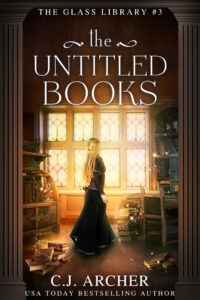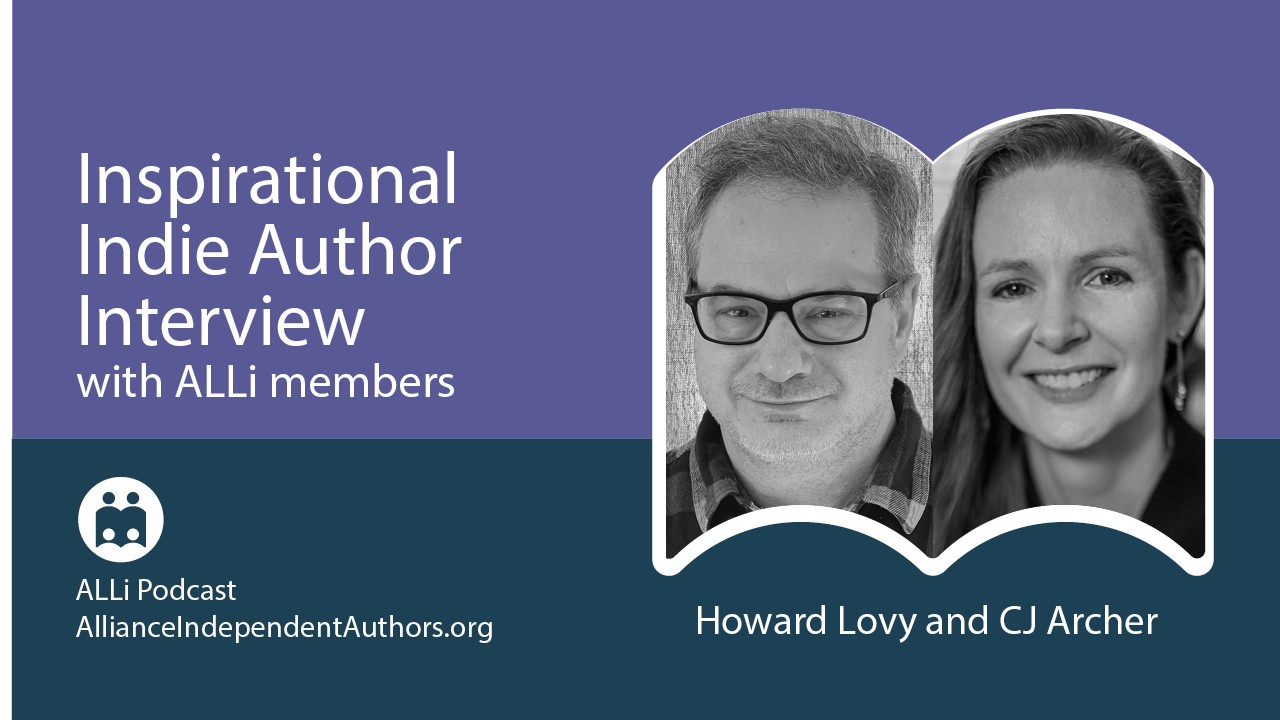My ALLi author guest this episode is CJ Archer, an author of historical, mystery, and fantasy books, genres that the traditional publishing industry told her should not mix. So instead, CJ published them herself and hasn't looked back since. She writes about four books a year as her full-time job and has found a formula that works for her and her fans.
 ALLi's Inspirational Indie Author Podcast stream is sponsored by Kobo Writing Life, a global, independent ebook and audiobook publishing platform that empowers authors with a quick and easy publishing process and unique promotional opportunities. To reach a wide readership, create your account today! Thank you, Kobo, for your support for this podcast.
ALLi's Inspirational Indie Author Podcast stream is sponsored by Kobo Writing Life, a global, independent ebook and audiobook publishing platform that empowers authors with a quick and easy publishing process and unique promotional opportunities. To reach a wide readership, create your account today! Thank you, Kobo, for your support for this podcast.
Find more author advice, tips, and tools at our Self-Publishing Author Advice Center, with a huge archive of 2,000+ blog posts, and a handy search box to find key info on the topic you need.
We invite you to join our organization and become a self-publishing ally, if you haven’t already. You can do that at allianceindependentauthors.org.
Listen to the Inspirational Indie Author Interview: CJ Archer
On the Inspirational Indie Authors #Podcast, @howard_lovy features @CJ_Archer, a history, mystery, and fantasy author who boldly mixes genres to her fans' delight. Share on XDon't Miss an #AskALLi Broadcast
Subscribe to our Ask ALLi podcast on iTunes, Stitcher, Player.FM, Overcast, Pocket Casts, Spotify or via our RSS feed:
Inspirational Indie Author Interview: CJ Archer. About the Author
 With more than 3 million copies of her books sold, C.J. Archer is the USA Today and Wall Street Journal bestselling author of over 60 novels in the historical mystery and historical fantasy genres. She has loved history and books for as long as she can remember and feels fortunate that she found a way to combine the two. She has at various times worked as a librarian, IT support person and technical writer but in her heart has always been a fiction writer. She lives in Melbourne, Australia, with her husband, 2 children and Coco the black and white cat. You can find CJ on her website, Facebook, X, and Instagram.
With more than 3 million copies of her books sold, C.J. Archer is the USA Today and Wall Street Journal bestselling author of over 60 novels in the historical mystery and historical fantasy genres. She has loved history and books for as long as she can remember and feels fortunate that she found a way to combine the two. She has at various times worked as a librarian, IT support person and technical writer but in her heart has always been a fiction writer. She lives in Melbourne, Australia, with her husband, 2 children and Coco the black and white cat. You can find CJ on her website, Facebook, X, and Instagram.
About the Host
Howard Lovy has been a journalist for more than 35 years, and now amplifies the voices of independent author-publishers and works with authors as a developmental editor. Find Howard at howardlovy.com, LinkedIn and Twitter.
If you’re a published indie author who would like to be interviewed by Howard for the Inspirational Indie Authors podcast, you need to be a member of the Alliance of Independent Authors.
Then contact Howard, including your membership number, explaining why you’re an inspirational indie author and what inspires you.
If you haven’t already, we invite you to join our organization.
Read the Transcripts — Inspirational Indie Author Interview: CJ Archer
Howard Lovy: My guest this episode is CJ Archer, an author of historical, mystery, and fantasy books, genres that the traditional publishing industry told her should not mix. So, instead, CJ published them herself, and hasn't looked back since.
She writes about four books a year as her full-time job and has found a formula that works for her and her fans. I'll let CJ Archer tell her story.
CJ Archer: Hi, I'm CJ Archer. I write historical fantasy novels and historical cosy mysteries. I've got two series going at the moment, the Glass Library series and the Cleopatra Fox mysteries.
I've grown up in Australia, born in Darwin up in the north. Lived in Queensland, lived in South Australia, different states, and I'm Victorian now, in Melbourne.
I've been reading my whole life; I think most authors have. I think I loved The Trixie Belden mysteries when I was a kid and mysteries have always been a part of my life. Then I came into historical fiction later on in my teens and early 20s and just fell in love with all periods of history and the historical genre in general; I just couldn't get enough of it.
Howard Lovy: CJ went to college and began to raise a family. All along, she tried to incorporate writing into her life.
CJ Archer: I went to university. I studied a Bachelor of Arts degree, but I majored in Environmental Studies. So, it's a little bit of a strange thing to major in under the Arts degree. That was a three-year course, and after that, I did a graduate diploma in Information Services, which was basically librarianship.
I was a librarian for, I don't know, all of about one year in a law library of all things, and then I branched out into doing support for a small IT company and being a technical writer, writing their training manuals and other manuals.
Then I left that to have kids, and I had been writing while I was working, I had been writing part-time, and then when the kids came along, I stopped work and tried to write a bit more when they were in bed and at night, and things like that, and then had to go back to work part-time and I was still trying to write, which, juggling work, kids, writing; it wasn't easy.
Howard Lovy: It wasn't easy to juggle work, family and writing, but CJ managed to accomplish it.
CJ Archer: By the time I was in my early to mid 20s and then, I was about 30, I think, when I had my first child, and I was definitely writing to be published at that point. I joined a Melbourne writers’ group, a couple of them were published. So, it was a group to hone your craft to get published. So no, I was writing to be published. I was submitting a lot. I had published some short stories in some women's magazines here and in the UK, and yeah, I just kept on going and trying to hone my craft.
As I said, it was around 2006/2007 that I got an agent. Although, in 2008 we parted ways.
Howard Lovy: CJ tried the traditional publishing route with an agent, but publishers had a hard time categorizing her fiction.
CJ Archer: Yeah, she wasn't a huge name agent, but she was active, and she really liked my stories, and we had great feedback from editors.
But the most common feedback was it was too different. So, I was writing historical fantasy, and they said, oh no, historical readers don't like fantasy, and fantasy readers want it set in a made-up fantasy world, not the real world, and I'm like, okay. So, that was disappointing.
They were generalizing, of course, and there's always the odd one that gets through, but they weren't willing to take that chance, and I get it, it's a numbers game at the end of the day. And at the end of the day, it was the best thing that could have ever happened to me, was getting rejected, when you look back now.
Howard Lovy: And that was when CJ decided on self-publishing.
CJ Archer: I had about five books ready to go, or almost ready. So, I put out maybe four books within a year and kept writing at the same time, kept writing new works, but those four books just kept building the momentum and kept it going, and each one, I'd get new readers.
It was a different game back in 2011. It was pretty easy to just discount your book and you'd get readers. You put your book for free and it was mixed in with the paid books on the Amazon chart. So, it got noticed.
It was an incredible ride at the time, but I made money and when I started in January, 2011, I'd chatted to my husband and at the time I'd stopped working, and I'd said to him, look, I'll go back part time, but I want to give this 12 months, and if in 12 months’ time, I'm not earning an income that I would have been earning as a part-time technical writer, then I will look for work. But yeah, after 12 months, I was earning enough that I didn't have to, so it was great.
Howard Lovy: CJ publishes about four books a year. They're a combination of mystery, fantasy, and history.
CJ Archer: I've always liked mystery elements. I've always read across multiple genres, but history was where I, it's what I love to write, and for a long time when I was trying to get published, I was writing contemporary and I was writing romance, and it just didn't work. I wasn't getting anywhere. I wasn't getting requests from editors or agents, and then when I switched to the historical, things changed for me and I just felt right and it felt comfortable, and I just loved it.
Writing the contemporary romances was such a grind. I hated it, and I'm thinking, what am I doing? When I switched to something I loved, it just shifted and fell into place.
I think there's inbuilt conflict, and I'm not just talking about romantic conflict where obviously, you put a hero and heroine together and they're from a different class, and there's automatically an inbuilt conflict in a historical setting, but I think when you add in the mystery element, you don't have all the technology and the forensics and mobile phones that made it easier, it just makes it a bit more old school. Policing is in its infancy, so it allows an amateur mystery sleuth t to take on a case and things like that. You can make the police force a little bit more slack or corrupt or things like that, and it's just got that inbuilt believability and inbuilt conflict automatically into it.
Howard Lovy: For CJ, writing is not only a pastime or hobby. She treats it like a job.
CJ Archer: I do treat it as a 9 to 5 job, although I tend to stop at 3.30 still. I like to be working as if it's a full-time job, and like I said, I will stop writing at 3.30, but then I'm sitting back at the computer at 5 o'clock again, or actually with a printed-out work that I did that day, and I'm editing at 5.
So, I think it's a job. It's not my hobby, it is my job, and it's a habit that I need for myself. I'm a habit person, but also, it's a habit that I've drilled into the rest of the family. Mum's working and to leave her alone in these times, unless you really need something, and it's just a good habit to have, I think.
Howard Lovy: And all the work paid off. CJ recently made the Wall Street Journal bestseller list.
CJ Archer: That was amazing. I actually don't really know a lot of the differences between all the bestseller lists. Obviously, the USA Today one disappeared, although it seems to have come back, and I had another author email me with a screenshot of the Wall Street Journal one, and I'm pretty sure I'd never made it before.
I don't really follow these things, but it was lovely to see. I think I got number eight or nine or something on the list, so I don't know, it sounds good.
Howard Lovy: One thing that CJ has been particularly successful at is visibility. She calls her strategy, marketing light.
CJ Archer: Yeah, look, I think when you've got to a certain level of success and you have been doing it a while, and what you do for promotion is very different to someone starting out. I do want to point that out, but I have always been a promotion light kind of person. I'm not someone who likes to put my face on camera, so TikTok and things are not for me.
I have first in series free. It's something I've done right from 2011. I think having, what I call a true series, where it's an ongoing series and not standalone novels within a series does help you when, you know, having that first in series free, people have a reason to keep reading.
Obviously, I try and get BookBub featured deals on the first in series. I do try and get a couple a year, it doesn't always work that way, but I keep trying.
At the end of the book, a couple of my popular series, I've written short stories, which are only available to newsletter subscribers from my website.
So, in the back of the books in those series that relate to those short stories, I mention that. So, I get a lot of organic subscribers who have loved my novels and they do want the free book, and they want to find out when the next book in the series comes out. So yeah, I've built up my newsletter subscribers that way over the years.
I have about 22 now, I think, 22,000, and they're all fans. I don't participate in newsletter swaps or anything like that, they're all readers.
All I have to do now, it's great, I just have to release a newsletter when I release a book or put up a new pre-order and mention it on my social media. I'll just do a post. That's it.
Howard Lovy: CJ's advice to other authors who, like her, might not write in traditional genres? Just put it out there, you never know what readers will accept until you try.
CJ Archer: Well, if you have tried the traditional route and that's what you're hearing, there's always an audience for something, and I think you've just got to put it out there and see. You never know which series will take off. I could not tell you which of my series would take off. The ones I thought would, haven't, and the one I really didn't think was going to make it has been the stellar performer.
So, I think as authors, we're too close to our work to ever truly know, and even our beta readers and our critique groups aren't going to know. There's always that uncertainty, and I think you just have to put it out there and give it a go, give it a shot.





